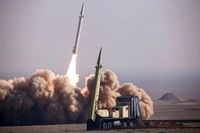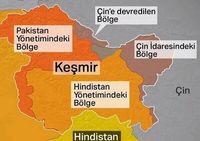Pakistan's Prime Minister Shahbaz Sharif announced on Wednesday that the country's National Security Council has authorized its armed forces to take "reciprocal actions" against India's airstrikes. This decision comes in the wake of deadly nighttime attacks by the Indian military that resulted in the deaths of at least 26 civilians and injuries to 46 others.
According to Reuters, this marks the most intense military confrontation between the two nuclear rivals in over two decades. Sharif stated that Islamabad is prepared to respond appropriately to New Delhi's actions, emphasizing that India has once again ignited flames of conflict in the region.
On April 22, a deadly attack in the Indian-controlled region of Pahalgam killed 26 people, prompting India to retaliate by targeting nine "terrorist infrastructure" bases within Pakistani territory. The Pakistani military confirmed that these attacks hit several areas, including Ahmadpur Sharqi, Mureedke, Sialkot, and Shakargarh in Punjab, as well as cities like Kohli and Muzaffarabad in Azad Kashmir.
In a statement, Pakistan's military spokesperson, Ahmad Sharif Chaudhry, claimed that five Indian fighter jets and one attack drone were shot down during the incursions. He specifically mentioned three Rafale jets, a MiG-29, and a Sukhoi-57 among the downed aircraft.
Pakistan's Prime Minister's Office referenced Article 51 of the UN Charter, which preserves the right to self-defense, stating, "Pakistan reserves the right to take retaliatory measures at a time, place, and manner of its choosing to defend the lives of innocent citizens and its national sovereignty." The statement further authorized the armed forces to undertake necessary countermeasures.
Sharif condemned India's actions as irrational and warned that the full responsibility for the consequences rests with New Delhi. Concurrently, Pakistan's Foreign Ministry summoned India's chargé d'affaires to express Islamabad's strong protest against what it termed "unprovoked and provocative attacks," warning that such reckless behavior poses a serious threat to regional peace and stability.
In response, Indian military spokespersons claimed during a press conference that their attacks targeted facilities belonging to militant groups such as Jaish-e-Mohammed and Lashkar-e-Taiba. They asserted that these bases were used for training, weaponry, recruitment, and indoctrination. They also stated that advanced weaponry and technologies were employed to minimize damage to infrastructure and civilians, although they did not specify the equipment used.
Vikram Misri, Secretary of India's Ministry of External Affairs, stated, "Intelligence indicated that further attacks from terrorist groups based in Pakistan were imminent, making preemptive action unavoidable." Misri accused Pakistan of failing to take action against these terrorist groups following the Pahalgam attack and added, "Pakistan remains unaccountable for supporting these groups."
In contrast, Islamabad denied any involvement in the Pahalgam attack, with Sharif proposing participation in an impartial investigation should one be established.
The current confrontation recalls the major military conflict in 2019, when an Indian airstrike in Balakot was met with a military response from Pakistan, leading to the downing of an Indian jet and the subsequent symbolic release of its pilot.
On Wednesday morning, heavy fire exchanges continued along the Line of Control (LoC), the disputed border between the two countries. Reports indicate that ten civilians were killed and 48 others injured in India, while at least six fatalities were reported on the Pakistani side.
Eyewitnesses reported hearing loud explosions in the Kashmir region under Pakistani control, particularly near the mountains surrounding Muzaffarabad. Following these explosions, the city experienced a power outage. The Pakistani Air Force conducted flights over Islamabad in response to the escalating tensions.
Pakistan's Ministry of Defense issued a statement regarding India's attacks on its soil, describing them as "unjustified and provocative." The Indian military announced the start of military operations within Pakistan, claiming a "precise strike" against terrorist camps.
Reports from Pakistani sources indicated that an attack occurred on a Pakistani airbase in Srinagar, with claims that India's actions resulted in the deaths of three non-combatants and injuries to twelve others. Additionally, two mosques were reportedly targeted during these attacks.
As the situation escalated, a Pakistani official announced that retaliatory operations against India were underway, involving simultaneous ground and air attacks. Local sources reported heavy artillery exchanges between Indian and Pakistani forces along the LoC.
Pakistan's military claimed that it had downed five Indian fighter jets during the conflict, while Indian authorities accused Pakistani forces of violating the ceasefire agreement by firing on the Indian-controlled area. This accusation followed India's own missile attacks against Pakistan.
Sharif reiterated that Pakistan reserves the right to respond decisively to India's military actions, emphasizing the unity of the Pakistani people alongside their armed forces. He stated, "We will never allow the enemy to succeed in its malicious objectives."
In a broader context, Khawaja Asif, Pakistan's Defense Minister, indicated that some Indian soldiers had been captured during the recent hostilities. He affirmed that Pakistan is open to dialogue with India if hostilities cease, but warned that any aggressive actions would necessitate a response.
As tensions mount, both countries are facing significant casualties, with reports indicating that India's attacks have resulted in at least 26 deaths and 46 injuries. Additionally, Pakistani officials reported that two mosques were damaged during the bombardments.
The situation remains fluid, with both sides on high alert as military operations continue. The international community is closely monitoring developments, with calls for restraint and dialogue to prevent further escalation.





